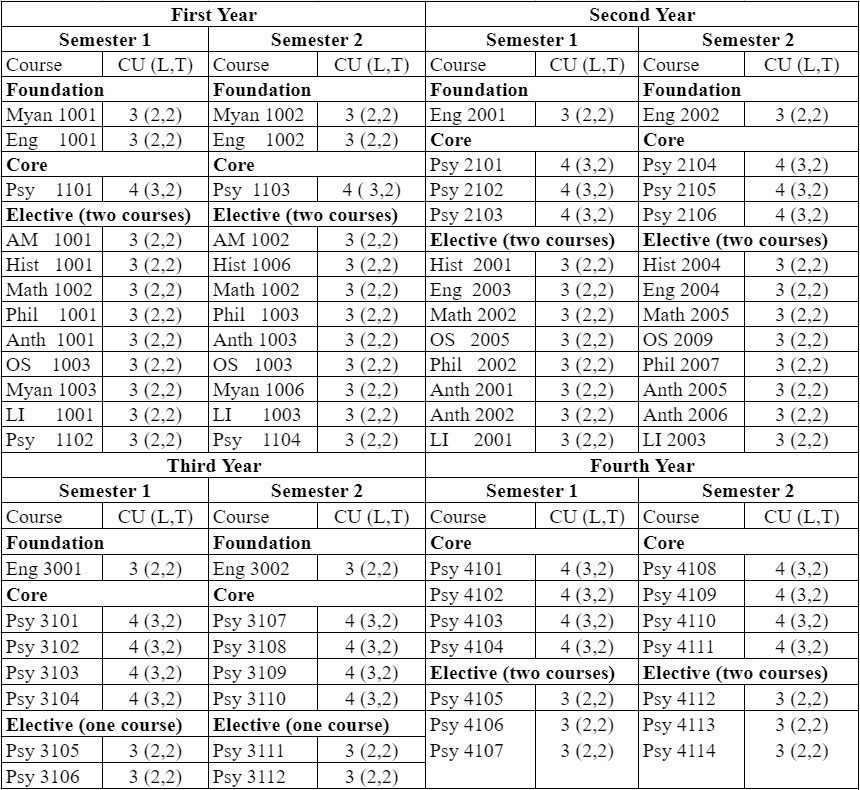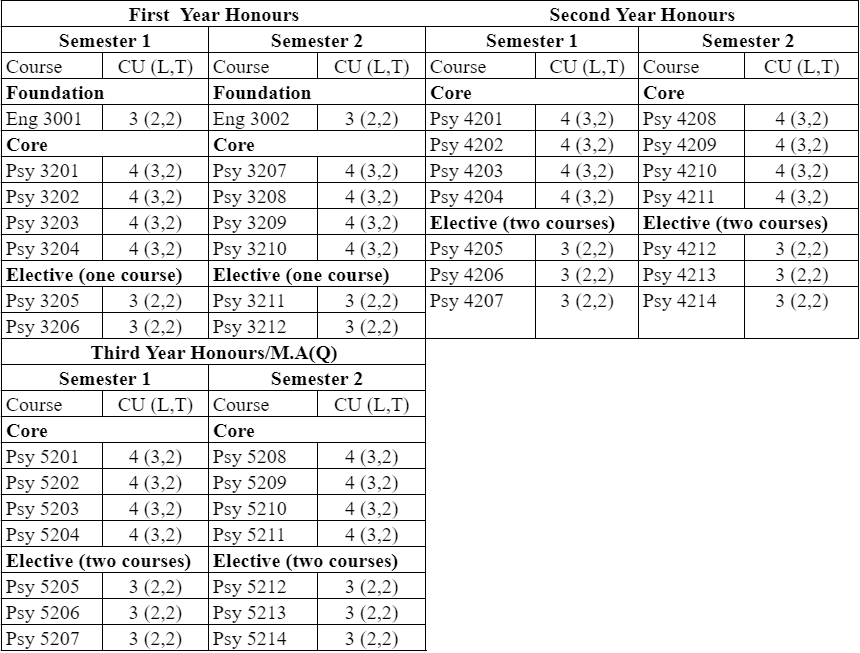
Dr.Yi Yi Myint
ဒေါက်တာရီရီမြင့်
Position : Professor (Head)
Degree : B.A (Hons;), M.A, Ph.D (Psychology)
Psychology
Position : Professor
Degree : Ph.DDr Naing Win
Teacher list
| Sr.No | Department | Name | Position | Education | Thesis Title | Field Of Specialization | Current Research Project | Email/Gmail |
| 1 | Psychology | Dr Yi Yi Myint | Professor (Head) | Ph.D | A Comparative Study of the Psychosocial Problems of Myanmar Alcoholics and Non-Alcoholics | Social Psychology | [email protected] | |
| 2 | Psychology | Dr Naing Win | Professor | Ph.D | Factors Associated with Organizational Citizenship Behaviors Among Myanmar Public Service Employees | Industrial and Organizational Psychology | Associated Factors of Organizational Citizenship Behaviors Among Teachers from Dagon University | [email protected] |
| 3 | Psychology | Daw Khin Wai Soe | Associate Professor | M.Res | Test Development and Validation of Big Five Personality Traits (Parallel Form A and B) | Social Psychology | [email protected] | |
| 4 | Psychology | Daw Myint Myint Thein | Tutor | M.A | Poverty and Delinquency: A Qualitative Study on Selected Juvenile Offenders in Yangon Region | Social Psychology | [email protected] |
Programmes Offered
- B.A. / B.A. (Hons) in Psychology
- M.A. and M.Res. in Psychology
Curriculum
B.A. in Psychology

B.A. (Honours) in Psychology

M.A. in Psychology

Course Descriptions
The purpose of this module is to enable students to understand the basic concepts of psychology. Students will learn, in the first semester, the nature, origin and methods of psychology. In addition, the module provides with the importance of biological bases of behaviour, sensation and perception in human behaviour, learning and memory, and language and thought. In the second semester, students will learn the human motivation, emotion, intelligence, personality and assessment of personality which are factors related to the behaviour of human.
The purpose of this module is to enable students to examine the critical age of adolescence. They will learn the physical, emotional, cognitive, social development and the impact of these developments on adolescence.
This module enables students to understand the child behaviour based on the physical, social, emotional and cognitive development. At the end of the course, they will be able to examine it according to the series of stages.
The aim of this module is to enable students to examine the impact of communication in human relation and ethics and social responsibilities.
The module familiarizes students with the biological basis of behaviour, the importance of heredity and environment, attention and perception in human behaviour, the influence of learning, motivation, emotion and intelligence of human behaviour.
The module covers the developmental psychology, the growth and development of human, key areas of development, faulty and healthy development and patterning of development.
The purpose of this module is to enable students to apply psychology in their life, mental health and guidance, psychological counseling. They will learn psychology in health and medicine, psychology in industry and business, psychology applied to crime and psychology applied to environment.
The purpose of this module is to enable students to examine the psychological concepts such as attention, perception, reaction time, learning, conditioning, retention and forgetting, transfer of training by the use of experimental methods. The focus of this module is on the combination of the theory and the practical.
The module includes the educational psychology: the nature, scope and methods of educational psychology, individual differences, learning in the classroom, classroom management and communication, and the psychology of the teacher.
The module deals with the stress, stressors, Stress Responses, Stress, Illness and health, and Coping with stress.
The aim of this module is to familiarise students with the individual and personality, social and cultural context and cultural differences in pro-social behaviour.
The module deals with selection, placement and training of individual, the factors effecting job performance, attitudes and behaviour of individuals, evaluation of job performance, job satisfaction, leadership in occupation, occupational stress, counseling skills for managers, and careers in organization.
The purpose of this module is to enable students to be familiar with the scope and methods of social psychology, culture and personality, social motives, social perception, the behavior of group, leadership, the nature and measurement of attitudes, and interacting with others.
This module is to provide the criteria of job performance, job analysis, personnel selection, job satisfaction, organizational culture, and conflict management in organization.
The purpose of this module is to familiarise students with the nature and scope of abnormal psychology, classification of mental disorders, dissociative disorder, anxiety disorder, schizophrenia, paranoid, mood disorder, anti-social personality disorder, and psychological treatment and service.
The purpose of this module is to train students how to analyze and compute the data, how to interpret the data and how to draw conclusion.
The module enables students to be familiar with the factors affecting the criminal behaviour, theories of criminal behaviour, legal system, the role of psychology in the legal system, and preventing or changing aggressive behaviour.
The purpose of this module is to provide the sense of community, the methods of community research, understanding coping and social support.
The purpose of this module is to enable students to be familiar with the concepts of development and ageing, biological aspects, sociological aspect, and psychological aspect of adult development and ageing.
The purpose of this module is to provide the knowledge of theories of counseling, counseling processes, skills used in counseling relationships, approaches to counseling, group counseling, family counseling, marital counseling, child and adolescence counseling.
The purpose of this module is to familiarise students with the personality and athlete, attention in sport, the effects of arousal, anxiety, and audiences on performance, motivation in sport, leadership and team cohesion in sport, aggression in sport, and psychological techniques for improving performance.
The purpose of this module is to enable students to explore the functions and origins of psychological testing, principle characteristics of tests, social and ethical implication of testing, reliability, validity, and norms. It familiarises them with the intelligence tests, aptitude tests, personality assessments, measures of interest and attitude, and situational tests.
The aim of this module is to familiarise students with research methodology in Psychology, the role and importance of research, different types of research, formulation of hypothesis, sample and population, qualitative, quantitative and mix methods that can be used to write a term paper or thesis.
The module deals with the psychological and behavioural therapies in health psychology, nature of stress, coping methods, psychological mechanisms of health and disease, healthy life style behaviours, pain and health psychology.
The module covers the approaches of the study of social problems, family-related problems, poverty, sex, age and social inequality, crime and delinquency, alcohol and drug abuse, and violence.
The purpose of this module is to enable students to be familiar with issues in personnel training, performance appraisal, human engineering, and managing job stress in the first semester. In the second semester, it familiarises students with issues and theories of the organization, group in organization, intergroup conflicts.
This module enables students to be acquainted with the contemporary perspectives of abnormal psychology, approaches to abnormal psychology, psychological factors in physical illness, and personality disorders. In the second semester, it familiarises them with the clinical assessment, interview and psychological tests, psychotherapy, biologically based therapy.
The module covers the role of theories in psychology, Pavlov’s classical conditioning, Skinner’s operant conditioning, and recent development in cognitive theories.
In the first semester, this module acquaints students with the research process, measurement process, research design and some conventional research design types. In the second semester, it familiarises students with the qualitative research and its methods, secondary research and secondary analysis, survey research and participant observation.
In the first semester, the module covers way of thinking and interacting with others, personal perception, self-perception and attitudes. In the second semester, it deals with Altruism, Aggression, and Conformity.
This module covers health related research, coping with illness, the role of health care professional and drug addiction.
The aim of this module is to enable students to be acquainted with aptitude and special ability tests, achievement tests and the assessment of learning disabilities, psychological measurement in industry and neuropsychological tests and procedures.
The module deals with neuroanatomical basis of behaviour, sensation, brain and consciousness, sleeping and working, learning and remembering, and emotion.
The purpose of this module is to enable students to be exposed to nature of cultural psychology, nature of culture, culture and mental process, and culture and social behaviour.
The aim of this module is to familiarise students with ecology and population, effects of environmental factors and behaviour, effects of human behaviour and the environment, and spaces and social interaction.
In the first semester, the module familiarises students with the nature of intelligence testing, measuring multiple aptitudes, personality inventories, measure of interest and values, projective tests and situational test. In the second semester, it acquaints students with the diagnostic interviewing, psychophysiological assessment, neuropsychological assessment, behavioural assessment, integration of clinical data, and use of computer in clinical assessment.
The purpose of this subject is to enable to study the psychodynamic theories, social learning theories, phenomenological theories, and dispositional theories.
The purpose of this subject is to enable to study the social and emotional development, cognitive development, moral development, and problems of childhood and adolescence.
The module covers advanced cognitive psychology: the perceptual organization, theories of perception, individual, social and cultural variations in perceptual organization, and the development of perceptual processes. Otherwise it includes environmental psychology: the definition of environmental psychology, ecology and population, effect of environmental factor on behaviour, effect of human behavior on the environment and spaces and social interaction.
This module covers the criterion development, techniques of selection, use of psychological tests in personnel selection, functional value of personnel tests, and combining tests into a battery and assessment centers. It also includes the general description and purpose of rating scale, types of rating scale, reliability and validity of rating scale.
The module covers health psychology: an overview of psychology and health, enhancing health and presenting illness, psychological problems of hospitalized patients, chronic health problems and evaluating behavioural interventions in hospital. Otherwise it includes consumer psychology: the objectives of consumer research, techniques of consumer studies, types of advertising, and evaluation of advertisement.
This module acquaints students with obedience, competition and cooper, structural aspects and elementary processes in groups, decision making in group, and inter group conflicts.
The module enables students to be familiar with the system approach, organization development, decision-making in organization, design of jobs, management of poor performance, and reward systems.
The module covers the counseling interview, interpersonal communication, family and marriage counseling, integrated counseling, cognitive-behavioural counseling, professional preparation and ethical and legal issues.
This module deals with the psychoanalytic therapy, behaviour modification, cognitive-behavioural therapies, and humanistic-experiential therapies.
The module covers the error of substitution and error of measurement, error in estimating observed score and true score, error of measurement as interaction between person and test, classical true-score theory, effects of test length on reliability and validity, and length necessary to obtain a desired reliability and given validity for psychometric theory and method. It also includes the attitude scale construction, scaling techniques basic problems, scaling techniques, theories of attitude change for attitude measurement and change.
The module deals with the paper based on the previous learning such as how to conceptualize the research problem, how to formulate the hypothesis, and how to approach to research process. It is intended for students to get the experience concerning discussion in seminar and reporting the paper.

